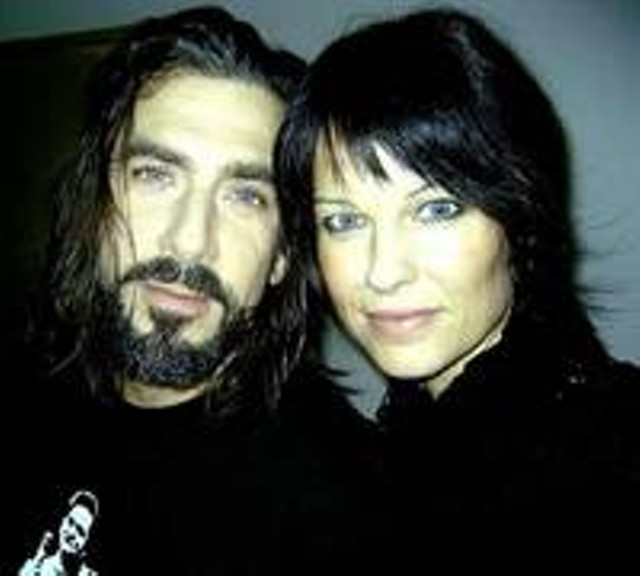Published July 25, 2007 at 4:11 p.m.
On a recent Sunday, the Mad River runs high, bringing scores of fishermen to the lush wilderness area just outside Granville. Close by on Route 100 stands D’s Dog House & Tavern, a low blue building with a sign that asks patrons to “Come Sit Stay. Good dogs!” Inside, with its jukebox and biking mags in the restroom, the place has a friendly, no-nonsense feel. Owner Dennis Vadnais, who looks a bit like Jerry Garcia, is talking to a wiry guy with tattoos, an AC/DC T-shirt and a wrist brace.
Larry Holden looks like he belongs here, but his subtle accent suggests a more distant origin. In fact, he’s a writer-director of indie films, originally from Northern Ireland. The wrist brace is treating a case of carpal tunnel brought on by scriptwriting, says his wife, Hanne Kristiansen, a Norwegian former model whose long auburn hair and chinoisierie blouse wouldn’t be out of place in Beverly Hills. She’s a fashion designer who sews clothes herself and sells them from a website that bears her name. The two are making a movie in Granville called All Sun and Little White Flowers, due to start shooting on July 30 and wrap in mid-August. Today, D’s Dog House is their HQ.
Casual onlookers might recognize Holden, 46, from the work he’s done as a Hollywood actor, notably in the films of Christopher Nolan. He played the small but pivotal part of Jimmy Grants in Nolan’s 2001 cult hit Memento, then appeared in the director’s bigger-budget productions Insomnia and Batman Begins. The latter film, in which Holden played a DA trying to clean up Gotham City, grossed $370 million worldwide.
When he calls the shots, though, this director makes very different movies, ones that are resolutely non-commercial. In 2002, his first feature, My Father’s House, made the round of film fests, garnering an award for Independent Achievement at the New York International Film and Video Festival. In a review on his website, Ray Carney, the legendary contrarian film scholar and author of Cassavetes on Cassavetes, called it “a triumph of low-budget brilliance” and “[o]ne of the truest, subtlest, best films I’ve seen in years.”
Since then, Holden has made five more films, all with evocative titles: Through His Door Up Your Stairs, Carrying Your Burden, In Your Room Out His Window, Drifter Did Escape, Tucked in His Knuckles. And without seeing them, that’s all you’re going to find out, because Holden won’t discuss the content of his movies. What’s the Granville movie about? Pressed by a reporter for the indie-film site Rogue Cinema, he replied none too seriously, “Uh, OK, OK, it’s a . . . film about a cross-dressing serial killer who’s saved, spiritually, by a Woody Guthrie impersonator with both a bad knee and a bad hip. How’s that?”
It’s safe to say that’s not what All Sun and Little White Flowers is about. But it’s also safe to say kids are involved. Holden’s 11-year-old leading lady, Sadie Chapman, just flew in from Birmingham, Alabama, accompanied by her mom, Bernadette, a friend of Holden’s. (Much of the 30-person cast and crew has yet to arrive from around the country and the world, Holden says.) Well-spoken and self-possessed, Chapman is already a veteran of theater productions in her hometown. While Holden and Kristiansen talk with Seven Days, she chats up 9-year-old Hancock native Ember Benatti, who’s just been cast as her best friend.
Afterward, Chapman confides to a reporter that she wants to be a CSI agent when she grows up. Benatti, who can barely contain her excitement about the movie, says she wants to be an artist — last year, she won the Secretary of State’s Official Vermont Symbols Poster Contest.
Holden’s old enough to know that being an artist in any medium is a difficult proposition. “It forces me sometimes to do things that I wouldn’t do, acting-wise,” he says, noting that he’s financing this movie with three acting jobs he’s signed to do next year. He pulls no punches when it comes to the Hollywood game, saying, “I’m a little more candid than some people might be. Sometimes I wish I could keep my mouth shut.”
But when it comes to their own films, Holden and Kristiansen — who finish each other’s sentences — seem as excited as the kids. They’re also enthusiastic about Vermont, where they rented a house “sight unseen,” says Kristiansen. Only one complaint: They wish it were easier to get sushi in the Mad River Valley.
SEVEN DAYS: Why Vermont? What brought you here?
LARRY HOLDEN: We were prepared to shoot this film in the Mediterranean; we were living on the island of Gozo. Then we changed our mind and didn’t know where to go. Vermont seemed like it was clean, there was room; you could find a little town and be away from everybody. People were supposedly very progressive, and there’s a huge art community.
HANNE KRISTIANSEN: We kept checking and comparing, and Vermont kept coming up. So we’re, like, maybe we should try Vermont, you know?
LH: We were a little bit concerned about the snow, ’cause we’re not used to it. We lived in L.A. for so many years . . . we try to find a cool place to live first, and then we adapt the film, if we’re gonna adapt it. We hire locals.
HK: We like to shoot places that are exotic, like, we shot in Hawaii and Ireland. People want to come to Vermont.
LH: I thought, it’s too nice around here, something’s gotta be wrong. But so far it’s the first place for four years now, honestly, that we thought, we’re not leaving. We’ve been here seven months and have literally fallen in love with it.
SD: What can you tell me about this movie?
LH: I can’t really delve near the story. To be honest, I’ll sometimes just make up crazy things, but I’ll make it so crazy that people know it’s not real. I don’t really talk about ’em.
SD: Why do you feel you don’t want to give an outline of the plot?
HK: That’s not how we like to watch movies, you know?
LH: The first reason is because we prefer it that way. We like to walk in, the lights go out, and there’s a certain bit of excitement, like, “OK, where are you taking us, you know?” We get so many letters from people; we have this kind of cult following, and they just get the next movie, they go completely blind into it. They’re not cheap, and our site’s the only place you can get them; we turned down NetFlix and Blockbuster. [DVDs run from $18 to $30 on Holden’s site, http://www.holdenautomotive.com.]
We turned down distribution for the first movie. When we realized most of those guys are snakes — and they are — we decided, we’ll self-distribute, and we can have complete control. I know it sounds crazy, but we walked away from one distribution deal because he wouldn’t give me control over the eventual VHS and DVD covers. Because Cameron Diaz is in that movie, I had a feeling I knew what kind of cover he was going to try and do, to sell the movie. She has a very small role in the film.
HK: You work years on this, and this is the package you want to sell. This is like our child, and you’re going to chop off an arm.
LH: . . . Send it to school with a bag over its head. It doesn’t seem right. So that’s the way we like it, and the people who like our films seem to like it. I’m surprised, ’cause we’re only seven in, and we’re still figuring out what the hell we’re doing, you know?
SD: So you have a mailing list?
LH: No . . . I don’t even know half the time how they hear of us. This year we got our first orders from South America. See, the Internet is this weird, crazy thing.
HK: They come from all over: Australia, Tokyo . . .
LH: . . . China . . .
HK: We’re always adding new countries, you know?
LH: I don’t think our movies, to be honest, would really do well in a theater anyway. Do well, I mean, I’m not worried about the money; I think they wouldn’t come off right. They’re really intimate in so many ways. I think that our audience seems to be the kind of guys that will wait until the kids are all down and the lights are low and there’s no noise, and then they sit and trip out on it, I guess. That’s what they tell us.
HK: It’s like, some people will go because it’s a [Werner] Herzog movie, you know? You don’t read about the movie, you just hear this guy’s making a movie. “Larry Holden’s making another movie; let’s get it!”
LH: It’s really bizarre. We didn’t expect it. We spent four years trying to get the first one made in Hollywood and got all kinds of great offers, all kinds of big people wanting to get involved, and ultimately we just realized — I knew enough about Hollywood to know it’s very hard to get control. We like the randomness of it. We pick [the actors], and we don’t care about the resumes. Cameron Diaz’s husband — and it was a decent-sized role in the first movie — was a bartender I met in a bar after I fired the first actor.
HK: You can’t do that in Hollywood.
LH: No. They have this little short list they would give us, and you know a bunch of people on the list, so sometimes you wouldn’t want to work with friends, or you know enough about them to know they’re a mess. Somebody like Tommy Sizemore, you know? And I’m not poking fun at Tommy Sizemore, ’cause I know him — they wanted him to do My Father’s House, and I talked to him on the phone about it, but to tell you the truth, I saw that train coming. [Sizemore has a well-publicized drug problem.] So you have to even turn down friends. They don’t care about the guy’s personal problems, they care about whether they could put so and so’s name [on the movie].
So to give them a big fuck you really felt good to us. Myself with my acting, Hanne with her clothing line, we financed these things. It felt good. One of those rare times where you just go, “It’s OK, I know it’s a lot of bread, but piss off.”
It’s always a struggle, but at least the dream seems like it’s coming true. We can do what we want, when we want, where we want, talk to who we want. Like, look, you didn’t even have to deal with a publicist. And, you know, they’re nightmares. They’re good for me, because they’re all, “Don’t ask him this; don’t let him drink, for crying out loud!” [Gestures at his glass, laughing].
SD: Do you shoot on digital?
Yeah, I couldn’t afford it if we went to film. I didn’t know that till right before the first movie, and I had to make that decision. My producer said, “Listen, you can shoot with a three-to-one ratio, which means you might get lucky in three takes if the scene’s not going right.” And then we saw The Celebration. It’s a Danish film, the first one with the Dogma label. [Dogma 95 is a stringent set of rules for minimalist filmmaking, practiced most famously by director Lars von Trier.] That was shot on digital, even though they blew it up to film. We saw it in Hollywood, and we loved the movie and said, “You know what? It’s a story, and we just have to zone in on the story.”
With three to one, on My Father’s House, I would’ve been buried. You get three shots at getting that take from a particular angle, and I had to take sometimes 26 takes because an actor wasn’t together, or we were experimenting or trying things.
We don’t pretend. We let people know . . . the money, the sets and everything else — if that’s what you’re into, go down the road. It kind of worked in our favor in a way, because a lot of the letters that we get say, “When we see you guys’ movie, we don’t know if we could do the subject matter or make the same movie, but we do feel like we could make a movie.” And that’s really encouraging, you know?
SD: Do you actually follow the Dogma rules?
LH: No, just the general idea. Which is, “Get those damn lights out of my face, and quit slowing up what could be a really exciting creative process with your technical bullshit.” The idea is just, let’s get back to stories.
SD: What about creative financing? You auctioned off some roles on eBay to raise money for one of your movies?
LH: We did. We were in Hawaii, shooting Tucked in His Knuckles, and one of our investors was served with divorce papers. It shook him, and he withdrew his investment. One of my producers said, “Why don’t you auction roles off on eBay?” He was joking, and I took him seriously and went in my office, and about an hour later it was up.
I thought, if anything it’ll just be funny. But then, like, in a week more than 50,000 people had come. You don’t raise decent money doing that, but we had to show ’em that we were desperate, and we would do whatever we could.
The ones who gave us shit about it — I’d say, “Do you know how it works in Hollywood? Those guys, they’ll cast according to what that person can bring in at the box office, and you don’t want me to cast according to what they’re contributing to my budget?” I don’t see a big difference there.
HK: They do it out of greed, and we do it from necessity.
LH: They make casting decisions based on [numbers]. Even Chris [Nolan], with his movies — maybe it’s different now, but I remember him telling me at one point that he gets lists of five names from studios. And most of them are Academy Award-winners. All [the studios] care about is “hot.”
SD: How much does it actually cost to make a movie like this?
LH: It’s always more than you have, you know?
HK: Four dollars and duct tape.
LH: Yup. You’re trying to make it with four dollars and duct tape, all the time. You learn really quick what you don’t need.
SD: Who are some directors you admire?
LH: Such a wide range of peo ple. People like Harmony Korine, Vince Gallo. I like Jim Jarmusch’s stuff, some of it. Cassavetes, Tarkovsky and Herzog. Most of them seem to be dead. Robert Bresson I really dig.
You can always tell when something’s not coming from someone’s heart. As corny as it sounds, you really know. If they’re teaching you that [how to open your heart] at film school, then go. But they don’t. It’s “Get this coverage over the shoulder, get this, get your master shot.”
HK: Anybody can make a movie now. They edit at home. The film schools are probably going, “Oh, my God, we gotta get them to feel like they have to go to film school.”
SD: Have you thought about putting film clips on sites like YouTube?
LH: I don’t think that’s anything we’d be involved with, because we don’t do trailers or anything. We don’t even put reviews on the DVD covers anymore, because we feel like they can say too much. The reviewer says it’s about this, that or the other thing, and [viewers] just buy into it. They forget that the reviewer is like anybody else.
HK: Most movies, there is just one thing it’s about; that’s the story, and everybody agrees. But that’s not the movies we like, and that’s not the movies we’re trying to make.
LH: We like the conversations at festivals. We’ve had people raise their hands and really have a whole different take on this movie, and I love it. I never say, “Oh, that’s wrong.” I mean, why wouldn’t any artist want a whole bunch of interpretations?
There’s probably a song that could come on that jukebox and take you back to some point in your life. But films tend not to do that with people, not too much, because there’s not a lot of room. They’ve been driven down your throat with all these corporate entertainment shows that pretty much just do trailers for their own fuckin’ movies. The song can still belong to the listener, and the film should belong to the viewer. It sounds corny and pretentious, but I believe that with all my heart.
More By This Author
Speaking of Mad River Valley
-

Madbush Falls Merges Biking, Beds and Booze
May 17, 2023 -

The Mad River Valley Remembers Five Teens With Constellations of Holiday Lights
Dec 21, 2022 -

Raising Homes: It Takes a Village to Grow Housing. How Vermont Towns Are Trying to Make It Happen
Jun 15, 2022 -

Clearwater Sports Offers River Adventures in Waitsfield
Jul 27, 2021 -

Dining on a Dime: East Warren Community Market
Apr 26, 2021 - More »
Comments
Comments are closed.
From 2014-2020, Seven Days allowed readers to comment on all stories posted on our website. While we've appreciated the suggestions and insights, right now Seven Days is prioritizing our core mission — producing high-quality, responsible local journalism — over moderating online debates between readers.
To criticize, correct or praise our reporting, please send us a letter to the editor or send us a tip. We’ll check it out and report the results.
Online comments may return when we have better tech tools for managing them. Thanks for reading.














































